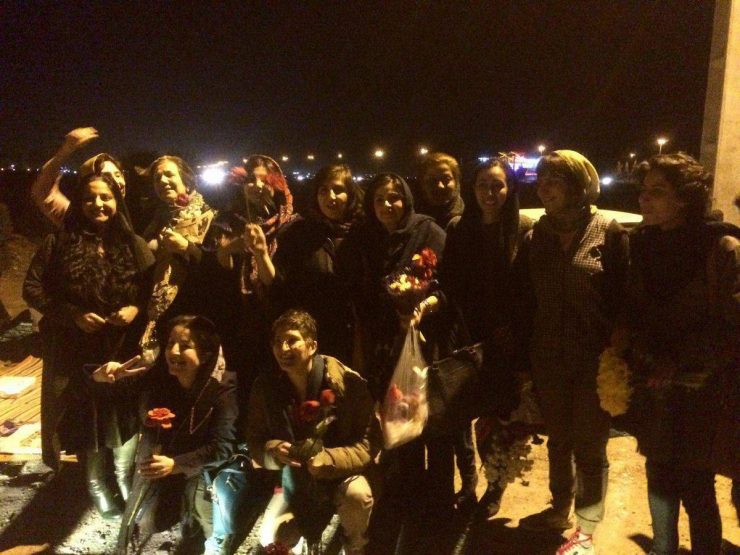CHRI – The women who were detained at a women’s rights demonstration in front of the Iranian Labor Ministry in Tehran on March 8, 2018, have all been released but five male demonstrators remain behind bars.

Women celebrate their release from Gharchak Prison on March 12.
The last of the female detainees were freed from Gharchak Prison in the city of Varamin after posting bail on March 12, a source with knowledge about the cases told the Center for Human Rights in Iran (CHRI).
The remaining male detainees—Ali Salem, Javad Abbas Tavalloli, Peyman Chehrazi, Ali Afsoongar and Mehrdad Ghazi—are in the Great Tehran Penitentiary (GTP) in the city of Fashafouyeh, near Tehran.
“The water [at GTP] is undrinkable and the detainees have to buy mineral water from the prison store but the store doesn’t accept cash,” the source told CHRI.
“You have to have a special prison bankcard that takes at least a week to get issued,” added the source. “So, during the first week, if the new prisoners want better water or food, they can only rely on prisoners who have been incarcerated for a longer time and that’s not easy under the conditions in this prison.”
Judicial authorities have promised the families that the five men will be released by March 16, the source told CHRI.
Police and security forces quickly broke up the gathering in front of the Labor Ministry on March 8, International Women’s Day, arresting more than 80 women and men that day according to the Telegram channel of the event’s organizers.
Tehran Prosecutor Abbas Jafari Dowlatabadi said on March 11 that the police arrested the demonstrators because they did not have a permit to hold a rally. However, all Iranian citizens are allowed to hold peaceful demonstrations according to the Constitution.
“The police executed a judicial order and arrested a number of people at the gathering… because forming a gathering requires a permit and it should not be mixed with anti-state activities, which police have the authority to confront,” Dowlatabadi said.
The judicial official’s statement violates Article 27 of Iran’s Constitution, which states, “Public gatherings and marches may be freely held, provided arms are not carried and they are not detrimental to the fundamental principles of Islam.”
Outspoken Parliamentary Deputy Speaker Ali Motahari, a conservative, spoke out against the harsh treatment of the protesters.
“Naturally, if the protesters had resorted to destructive actions, it would have been a different story,” Motahari told the semi-official Iranian Labor News Agency (ILNA) on March 11. “But we heard the gathering was peaceful and no violence took place. Therefore, given the fact that the gathering was not violent, we will look into this matter and ask appropriate questions of the responsible officials.”
An eyewitness said the police became violent with the women’s rights campaigners as soon as they got close to the Labor Ministry’s headquarters located on Tehran’s Azadi (Freedom) Street.
“We were in the alley by the Labor Ministry at a quarter to 12 when agents on motorcycles attacked and arrested the guys,” said an unnamed eyewitness in a post on the organizers’ Telegram channel on March 8.
“They hit Zohreh Asadpour and I saw that she had a bloody lip,” added the eyewitness. “Each of us tried to help the detained. Zohreh was trying to separate someone. Every time the people were dispersed, they would start shouting slogans in another corner.”
A statement that the organizers were hoping to read at their rally called for an end to the widespread and institutional discrimination against women in Iran, especially in employment and higher education.
“We are a group of women who have gathered on March 8 to mark International Women’s Day by honoring the memory of women who have ceaselessly fought for their rights since the [1905-2011] Constitutional Revolution until today and express our dissatisfaction and objection to the terrible and degenerating condition of women and the suppression of our human and social rights,” said the statement.
Referring to the anti-compulsory-hijab “Girls of Revolution Street” movement, the statement also called for “the official recognition of the right to choose clothing, which women today are demanding as an obvious basic right and the end of violent reactions to protesters against the forced hijab and stop treating them like they’re criminals.”
Since January, at least 30 women and men have been arrested for removing their headscarves in various cities across Iran.
Iran’s Supreme Leader Ali Khamenei has also described the anti-compulsory-hijab protests as “small and insignificant” and accused the protesters of being tricked by foreign countries without providing any evidence for his claim.
 Shabtabnews In this dark night, I have lost my way – Arise from a corner, oh you the star of guidance.
Shabtabnews In this dark night, I have lost my way – Arise from a corner, oh you the star of guidance.


